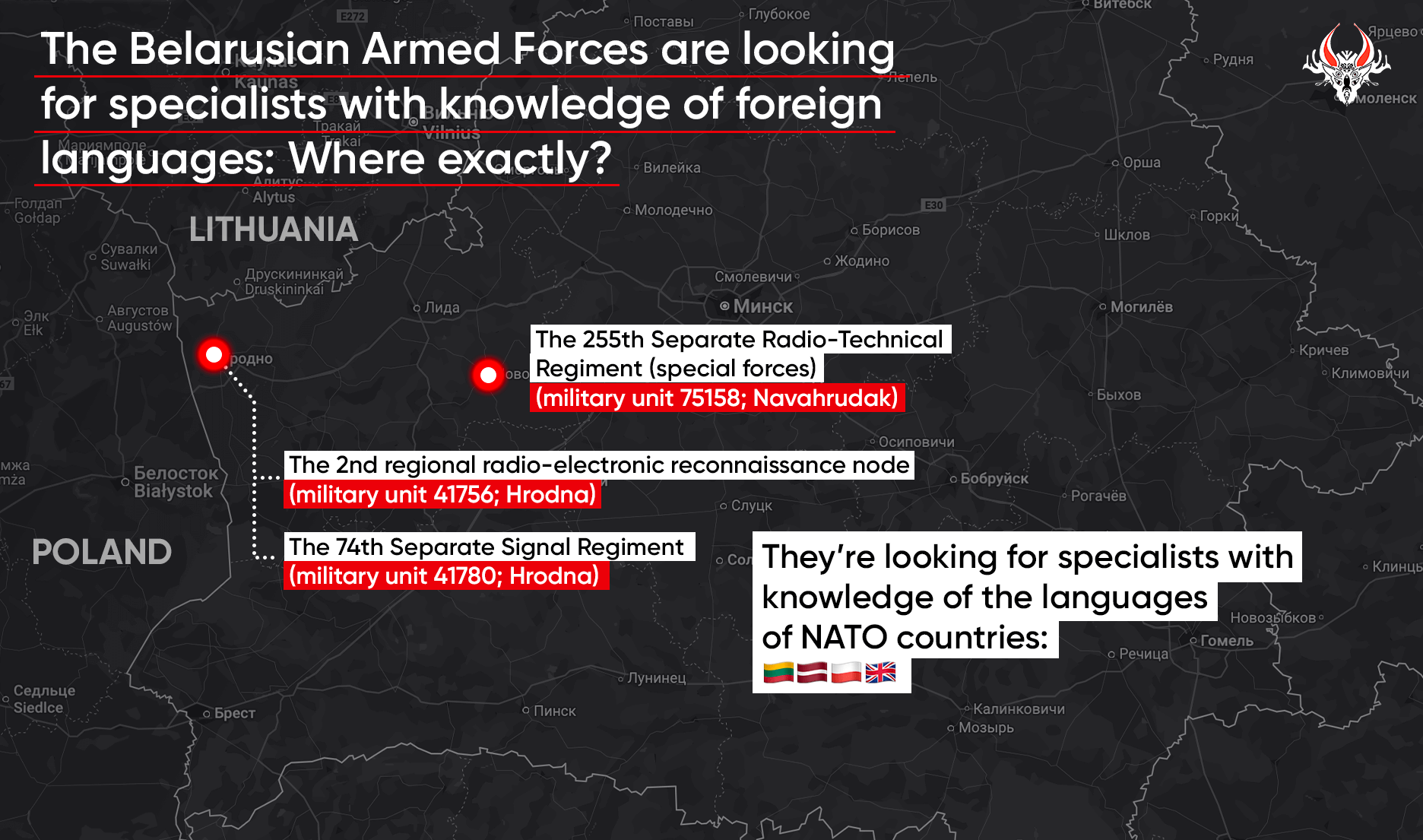But they don't need Ukrainian.
In October 2023, we told that one of the radio-electronic reconnaissance (RER) units deployed in Pastavy district was looking for specialists with knowledge of Lithuanian language. In 2024, the number of such vacancies increased.
According to Belarusian Hajun, new vacancies have been opened in the RER and communication units of the Belarusian Armed Forces, where knowledge of foreign languages is required. Specialists with knowledge of the state languages of the NATO countries bordering Belarus are invited for military service under contract: Lithuanian, Latvian, Polish, and English.
The website of the Ministry of Defense of Belarus says that RER is a unique way of collecting intelligence information. Without risking personnel, it can sometimes reveal by a single radio signal or a single phrase in a radio exchange what other types of intelligence can’t. It is also noted that “the RER system of the Armed Forces reliably provides the state and military-political leadership of the country with necessary and reliable information.”
Simply put, RER is the process of collecting, analyzing, and using data obtained through radio-electronic means to detect and track enemy activity. The purpose of RER is to provide military authorities with the necessary information about a potential enemy.
Which units are looking for specialists with knowledge of foreign languages?
—The 2nd regional RER node (military unit 41756; Hrodna) is looking for specialists for the position of “Operator” with knowledge of Lithuanian, English or Polish. The search for specialists with knowledge of Lithuanian and Polish is not accidental, as the RER node is located in close proximity to the border with both Poland and Lithuania. The vacancy is open for both male and female personnel. The number of vacancies is unknown.
The 2nd regional RER node is part of military unit 30695 – the 153rd Radio-Technical Brigade (special forces). The brigade is subordinate to the Main Intelligence Directorate of the General Staff of the Belarusian Armed Forces. The brigade’s administration is located in Valozhyn (Minsk region). Its units are stationed in Brest, Hrodna, Mazyr, Vitsiebsk and Pastavy district.
— The 255th Separate Radio Technical Regiment (special forces) (military unit 75158; Navahrudak) is looking for specialists for the positions of “Unit Commander”, “Operator” and “Senior Operator” with knowledge of a foreign language (Lithuanian, Latvian, Polish, English). The search for specialists with knowledge of the state languages of all NATO countries bordering Belarus is due to the fact that the regiment performs a wider range of tasks than the above-mentioned RER node. Vacancies in the regiment are available only for men. Their number is unknown.
There is little information about the regiment in open sources. It is known that the unit is subordinate to the Main Intelligence Directorate of the General Staff of the Belarusian Armed Forces. In December 2021, the commander of the unit said: “A distinctive feature of the regiment is that even in peacetime, the servicemen fulfil a combat mission. […] The regiment’s radio reconnaissance personnel have repeatedly confirmed their professionalism during drills.”
—The 74th Separate Signal Regiment (military unit 41780; Hrodna) is looking for specialists for the position of “Operator” with knowledge of a foreign language (Lithuanian, English, Latvian, Polish). The vacancy is open for women only. The number of vacancies is unknown.
The regiment is part of the Western Operational Command (WOC) of the Belarusian Armed Forces of Belarus. It performs the task of providing communications for the command and military units within the Western Operational Command.

The search for specialists with knowledge of foreign languages for RER units is not unique. Knowledge of foreign languages is critical for intercepting and analyzing (translating, decrypting) military communications of neighboring states. For this reason, cadets at the Military Intelligence Faculty who are trained in the specialty “Management of RER units” receive the qualification “Management specialist with knowledge of foreign languages.”
We note that another way to attract specialists with knowledge of foreign languages to the army is to organize training courses for servicemen. For example, in June 2024, services to train personnel in spoken English at the A1 (elementary) level were purchased for the 228th Separate Electronic Warfare Regiment (military unit 32404, Polatsk).
At the same time, the increase in the number of vacancies in the Belarusian Armed Forces for specialists with knowledge of foreign languages is notable. Amid the belligerent rhetoric of the Lukashenka regime, as well as the constant accusation of the Western countries in aggressive actions against Belarus, this is not surprising. We may assume that the military is increasing its RER against the NATO countries bordering Belarus.
It is also possible that the increase in the number of vacancies is also due to the dismissal of servicemen from the units mentioned above. Therefore, the military simply fulfil the personnel shortage.
It is notable that the Belarusian Armed Forces do not (yet) require specialists with knowledge of the Ukrainian language. There may be the following reasons for this:
- all vacant positions have already been taken;
- the Belarusian military is not going to attack Ukraine;
- the Belarusian military think that Ukrainians mostly speak Russian;
- the Belarusian military understand the Ukrainian language without special training.
